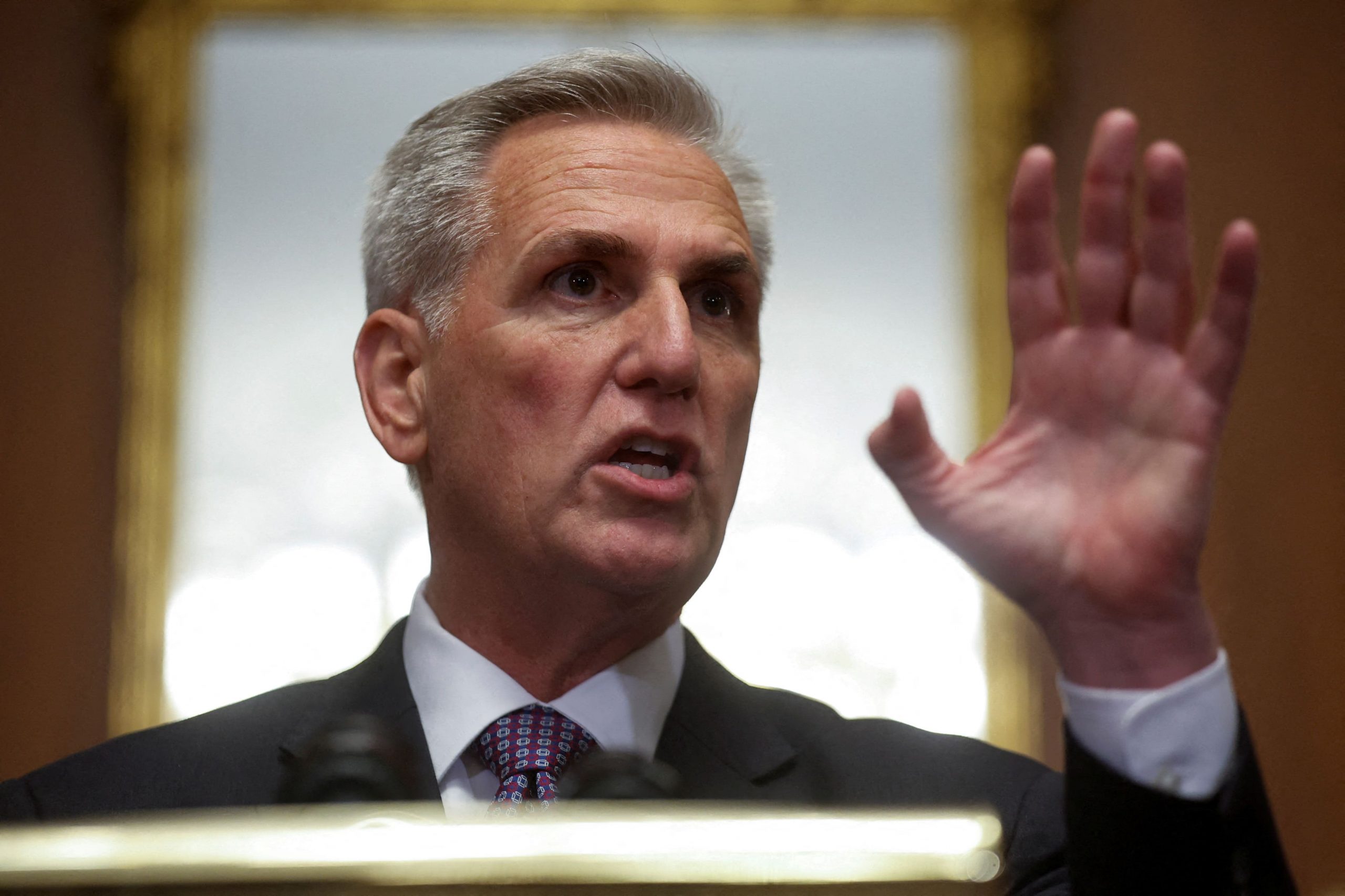Economy
US debt ceiling battle rekindles debate over Ukraine funds

The battle to raise the U.S. debt ceiling rekindled debate in Congress over funding for Ukraine, as House of Representatives Speaker Kevin McCarthy said on Tuesday he had no immediate plans to take up legislation to boost defense spending beyond what was in last week’s deal.
McCarthy’s comments could signal a tougher road through Congress when President Joe Biden next asks for additional funds for Ukraine. The House and Senate last approved aid for the Kyiv government – $48 billion – in December, before Republicans took control of the House.
That money is expected to last at least through Sept. 30, the end of the current fiscal year. Lawmakers said Biden is expected to request more funds by August or September.
The debt ceiling agreement, which Biden signed into law on Saturday, capped national security spending in the year ending Sept. 30, 2024 at $886 billion, the amount Biden requested but below what congressional defense hawks wanted.
After some Republicans threatened to vote against the deal over the tightened defense spending, the Senate’s Democratic and Republican leaders promised that the caps would not prevent the chamber from passing supplemental spending legislation to provide more money for Ukraine and the Department of Defense.
However, McCarthy, who negotiated the agreement with Biden, said he would not automatically allow a vote on supplemental spending legislation in the Republican-led House.
“It doesn’t matter if it’s Ukraine or anything else. The idea that someone wants to go do a supplemental after we just came to an agreement is trying to blow the agreement,” McCarthy told reporters at the Capitol.
SOME SENATE REPUBLICANS DISAGREE
However, some Republican senators still said they believed a supplemental spending bill would be necessary.
“I strongly believe we are going to need a supplemental for defense,” Senator Susan Collins, the top Republican on the Senate Appropriations Committee, told reporters.
McCarthy said he supported Ukraine and helping Ukraine to defeat the Russian invasion but would want more information before moving ahead.
“I’m not giving money for the sake of giving money. I want to see what is the purpose, what is the outcome you want to achieve and then show me the plan to see if I think that plan actually can work?” he said.
House Republicans want any money for Ukraine – or other priorities – to move ahead via “regular order,” with Congress debating and passing the 12 appropriations bills lawmakers will work on this summer to fund government programs in the fiscal year beginning Oct. 1.
Overall, the House and Senate have approved more than $113 billion of military assistance and other aid for Ukraine since Russia invaded in February 2022. The four tranches of assistance all passed with strong support from both Republicans and Democrats, although all were approved while Democrats controlled both the Senate and House.
Economy
Russian central bank says it needs months to make sure CPI falling before rate cuts -RBC


© Reuters. Russian Central Bank Governor Elvira Nabiullina attends a news conference in Moscow, Russia June 14, 2019. REUTERS/Shamil Zhumatov/File Photo
MOSCOW (Reuters) – Russia’s central bank will need two to three months to make sure that inflation is steadily declining before taking any decision on interest rate cuts, the bank’s governor Elvira Nabiullina told RBC media on Sunday.
The central bank raised its key interest rate by 100 basis points to 16% earlier in December, hiking for the fifth consecutive meeting in response to stubborn inflation, and suggested that its tightening cycle was nearly over.
Nabiullina said it was not yet clear when exactly the regulator would start cutting rates, however.
“We really need to make sure that inflation is steadily decreasing, that these are not one-off factors that can affect the rate of price growth in a particular month,” she said.
Nabiullina said the bank was taking into account a wide range of indicators but primarily those that “characterize the stability of inflation”.
“This will take two or three months or more – it depends on how much the wide range of indicators that characterize sustainable inflation declines,” she said.
The bank will next convene to set its benchmark rate on Feb. 16.
The governor also said the bank should have started monetary policy tightening earlier than in July, when it embarked on the rate-hiking cycle.
Economy
China identifies second set of projects in $140 billion spending plan


© Reuters. FILE PHOTO: Workers walk past an under-construction area with completed office towers in the background, in Shenzhen’s Qianhai new district, Guangdong province, China August 25, 2023. REUTERS/David Kirton/File Photo
SHANGHAI (Reuters) – China’s top planning body said on Saturday it had identified a second batch of public investment projects, including flood control and disaster relief programmes, under a bond issuance and investment plan announced in October to boost the economy.
With the latest tranche, China has now earmarked more than 800 billion yuan of its 1 trillion yuan ($140 billion) in additional government bond issuance in the fourth quarter, as it focuses on fiscal steps to shore up the flagging economy.
The National Development and Reform Commission (NDRC) said in a statement on Saturday it had identified 9,600 projects with planned investment of more than 560 billion yuan.
China’s economy, the world’s second largest, is struggling to regain its footing post-COVID-19 as policymakers grapple with tepid consumer demand, weak exports, falling foreign investment and a deepening real estate crisis.
The 1 trillion yuan in additional bond issuance will widen China’s 2023 budget deficit ratio to around 3.8 percent from 3 percent, the state-run Xinhua news agency has said.
“Construction of the projects will improve China’s flood control system, emergency response mechanism and disaster relief capabilities, and better protect people’s lives and property, so it is very significant,” the NDRC said.
The agency said it will coordinate with other government bodies to make sure that funds are allocated speedily for investment and that high standards of quality are maintained in project construction.
($1 = 7.1315 renminbi)
Economy
Russian central bank says it needs months to make sure CPI falling before rate cuts -RBC


© Reuters. Russian Central Bank Governor Elvira Nabiullina attends a news conference in Moscow, Russia June 14, 2019. REUTERS/Shamil Zhumatov/File Photo
MOSCOW (Reuters) – Russia’s central bank will need two to three months to make sure that inflation is steadily declining before taking any decision on interest rate cuts, the bank’s governor Elvira Nabiullina told RBC media on Sunday.
The central bank raised its key interest rate by 100 basis points to 16% earlier in December, hiking for the fifth consecutive meeting in response to stubborn inflation, and suggested that its tightening cycle was nearly over.
Nabiullina said it was not yet clear when exactly the regulator would start cutting rates, however.
“We really need to make sure that inflation is steadily decreasing, that these are not one-off factors that can affect the rate of price growth in a particular month,” she said.
Nabiullina said the bank was taking into account a wide range of indicators but primarily those that “characterize the stability of inflation”.
“This will take two or three months or more – it depends on how much the wide range of indicators that characterize sustainable inflation declines,” she said.
The bank will next convene to set its benchmark rate on Feb. 16.
The governor also said the bank should have started monetary policy tightening earlier than in July, when it embarked on the rate-hiking cycle.

 Forex3 years ago
Forex3 years agoForex Today: the dollar is gaining strength amid gloomy sentiment at the start of the Fed’s week

 Forex3 years ago
Forex3 years agoUnbiased review of Pocket Option broker

 Forex3 years ago
Forex3 years agoDollar to pound sterling exchange rate today: Pound plummeted to its lowest since 1985

 Forex3 years ago
Forex3 years agoHow is the Australian dollar doing today?

 Cryptocurrency3 years ago
Cryptocurrency3 years agoWhat happened in the crypto market – current events today

 World3 years ago
World3 years agoWhy are modern video games an art form?

 Commodities3 years ago
Commodities3 years agoCopper continues to fall in price on expectations of lower demand in China

 Economy3 years ago
Economy3 years agoCrude oil tankers double in price due to EU anti-Russian sanctions

























